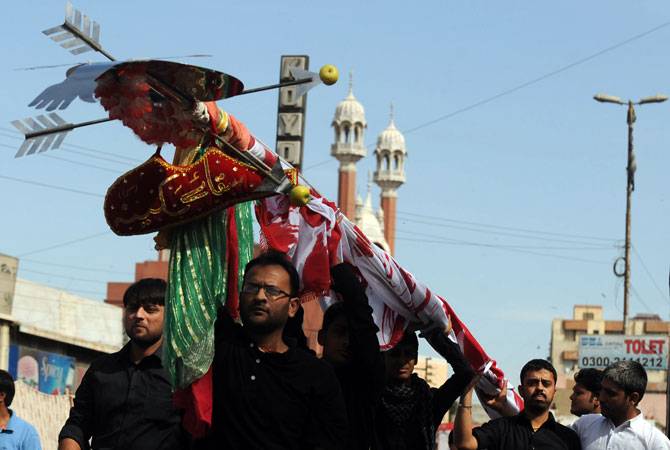History documents and Muslims every year, recall the tragic battle of Karbala that took place 561 years ago. It was barely 50 years after the death of the Prophet Mohammad (PBUH) that the Muslims engaged in one of the deadliest and a tragic battle that was to ever be witness. Some facts of this battle are undeniable and unanimously accepted- eight, are important. The first was that the battle was between Yazid, the vile and corrupt son of Mu’awiya and the Prophet (PBUH)’s own grandson Hazrat Imam Hussain(AS) whose character bore the mark of the Prophet’s own belief and upbringing. The second was that both were Muslims. The third was that the circumstance which brought Yazid’s forces and Imam Hussain face to face, was Imam Hussain (AS)’s refusal to offer allegiance to Yazid as a Caliph. Fourth was that Imam Hussain may have left Madina for Kufa after being asked by the people to lead their resistance against Yazid, but even when he discovered that under pressure from Yazid’s new governor Abdullah ibnZiyad , the Kufians deserted him, Hussain opted for resistance against Yazid instead of offering him allegiance.
The Fifth was the asymmetry of the forces at Karbala- Yazid’s 30,000 army and Imam Hussain’s group of 72 family members including six-month old Ali Asghar. The Sixth was pertinent to Karbala Imam Hussain and all the men in his group martyred fighting courageously against Muslim ruler Yazid’s army. But, when his sister BibiZainab and remaining women and children were dragged through the streets of Karbala, Kufa and Damascus to Yazid’s court, emboldened by the atrocities suffered at Karbala the Prophet’s(PBUH) granddaughter and Hazrat Ali’s daughter Zainab spoke truth to power, as few would do in history. The seventh is the history’s great martyr Imam Hussain, was annihilated on the battle-field of Karbala but he lives on in the hearts millions while Yazid , who defeated Husain at Karbala, could only be remembered as the ultimate evil that can and does find its way in the ranks of Muslims. Eight is at Karbala, the physical and material strength proved inconsequential when faced with the strength and the conviction that rests in human spirit. But indeed the glory of the human spirit, its ascendancy flows from the presence of a moral compass that must be rooted in sensitivity, kindness and collective good.
Interestingly, at the core of the current civilization, crisis that confronts us, where lies the brutality and bestiality around us which is crafted and spread by misguided collectives. Our primary challenge remain,s to alter the dynamic of destructive hate and poisonous self- righteousness from our immediate and global context.
Meanwhile, regarding Imam Hussain- it seems to me that what we see around us today was what the Prophet, Ahl-e Bayat and Sahaba including Imam Hussain has forewarned us of. Imam Hussain at Karbala insisted on another way of being, another way of exercising authority and another way of calculating our successes. As we witness and live the deadly and crumbling of civilization, we have to ask ourselves if there was a way to avert this. We all have different answers - my submission in this prolonged moment of human anxiety is that while the Prophet (PBUH) and the Holy Quran were both the Messenger and the Message , at Karbala the Message for acted out with a finality that we have not seen since both, what Imam Hussain opposed, in the form of Yazid is what finally devoured the core of Quranic morality- it’s text and spirit . So firstly, it was about how crucial it is for authority and power to remain within a moral code. Daesh, Saddam, al- Qaeda Taliban, Hafez al Assad and others, are all an outcome of an abandoned code of set out for those in authority in the Quran- and Imam Hussain stood for that code . Its relevance today is as current as it was 1400 years ago.
The personal moral code, again of the Quran , the Prophet and the Sahaba, the four Caliphs at varying degrees, is what was at display in Karbala with a finality . It is critical that we retain our own sense of responsibility as we critique those in authority - and of course those that don’t have authority - even within the hour walls of our homes. We all have different reference points - and everyone’s is important for them - bible, Geeta or Talmud. For millions Karabala and Imam Hussain , the illustration of the Spirit of Islam in the individual and collective context is their reference point. For them Ahle Bayat and especially Imam Hussain at Karbala represent the pinnacle of human ascent in Soul and spirit, and indeed the wisdom of Karbala.






